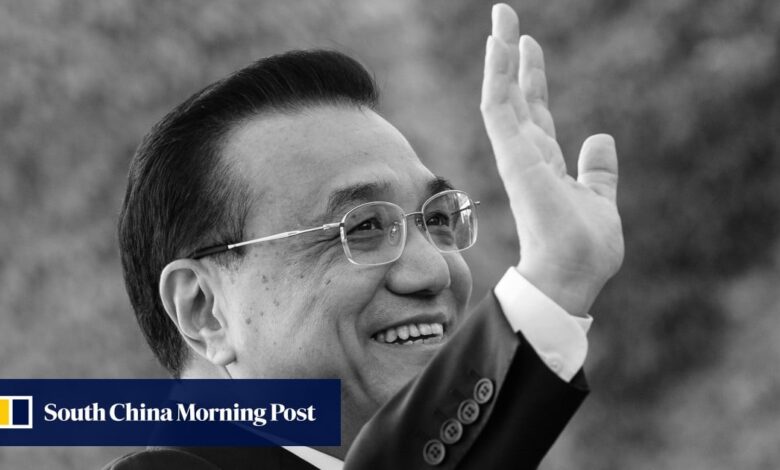Li Keqiang: decades of diligence on China’s economic front lines

He was tipped as a leading candidate to succeed president Hu Jintao, who had been his boss when Hu headed the Communist Youth League from 1984 to 1985. After Hu became the country’s top leader in 2002, the youth league became a bastion of cadres destined for promotion to top party and government positions.
Li, who worked in the youth league’s central committee for over a decade after he graduated from Peking University in 1982, became the league’s head in 1993 at the age of 38, reportedly at Hu’s recommendation.
Li may have dismissed speculation of promotion but he was destined for bigger things. He would soon advance to vice-premier and then premier.
To those who knew him from an early age, Li was a scholarly and hardworking man known for his photographic memory and academic credentials, with aspirations to serve the country and improve the livelihood of the people. But at the same time, a person who faithfully carried out his duties and knew his limits, according to those who met him early in his life.
He was born in Hefei, Anhui province, in July 1955. In 1974, after completing high school Li, like so many of his generation, was sent to work in an impoverished village.
Li’s destination was the village of Dongling in Fengyang county, where he was nominated for party membership.
Peng Jingshan, the village’s party secretary from the late 1950s to 2004, said he nominated Li because he was well educated and worked hard on the farms.
In an interview in 2007, Peng described Li, the son of a middle-ranking court official in Anhui, as someone who carried a big box of books with him and read all the time.
One of Li’s high schoolteachers said he was someone with high aspirations but not the kind of person to “get close to the liberal intellectuals” – even though some of his Peking University peers later became dissidents with different views about politics and China’s future.
Li was a cautious person, probably influenced by his father who was an “old revolutionary” of the party, the teacher said in an interview in 2007.
Hong Kong politicians remember ‘amiable’ ex-Chinese premier Li Keqiang after death
Hong Kong politicians remember ‘amiable’ ex-Chinese premier Li Keqiang after death
At university, Li was a student of prominent law professor Gong Xiangrui, an expert on Western constitutional law who studied in Britain in the 1930s.
Li’s strong academic background could explain why he came up with his own set of indicators to gauge progress when he took the helm of Liaoning’s development. In 2010, The Economist referred to those indicators as the “Li Keqiang Index”.
In 2013, analysts at investment bank Barclays came up with the term “Likonomics” to encompass the three pillars of Li’s economic policies: no stimulus, deleveraging and structural reform.
Li Keqiang: in China and overseas, tributes flow for warm, capable former premier
Li Keqiang: in China and overseas, tributes flow for warm, capable former premier
When Li became vice-premier in 2008, it was already clear that Xi Jinping would succeed Hu as the country’s top leader in 2012 and that Li would play second fiddle as premier.
In his five years as vice-premier, Li took on many important assignments including the Three Gorges Dam power project and healthcare reform.
But in his decade as premier, he was mostly in Xi’s shadow, with the president taking personal charge of a large range of responsibilities from foreign affairs to economic reform.
Several rounds of structural reforms also centralised power under the party and turned the State Council headed by the premier into an administrative arm, giving Li less decision-making power as premier than his predecessors.
Still, Li diligently carried out duties given to him and went to the front lines during crises. In 2014, he walked some 5km (3 miles) on a muddy road to visit the epicentre of a deadly earthquake that killed more than 600 people in southwestern Yunnan province.
In January 2020 when the Covid-19 outbreak in Wuhan, Hubei province, exploded into a national crisis, he was made head of a central leading group to fight the epidemic. He went to the city’s Jinyintan Hospital directly after arriving from Beijing. In the following weeks, field medical centres were set up and Li went to the construction site of Huoshenshan Hospital to try to boost the morale of the frontline workers.
During his last televised press conference in March last year, Li highlighted how he used his tenure to help improve the livelihood of the people and streamline government bureaucracy.
China’s Communist Party mourns Li Keqiang’s death, praises achievements
China’s Communist Party mourns Li Keqiang’s death, praises achievements
In a widely circulated video clip of his farewell speech to 800 or so staff from the State Council, Li said the government had had a tough time in the previous five years because it had to fight a trade war with the United States and the Covid-19 pandemic at the same time.
He joked that the weather was good on the day probably because the hard work of the State Council, the country’s cabinet, had been acknowledged by the heavens.
Li might have been referring to his own hard work – he will certainly be acknowledged and remembered for his pragmatism, diligence and dedication to securing the basic necessities of life for the public.
Li is survived by his wife Cheng Hong, who is an English professor at Capital University of Economics and Business in Beijing, and a daughter. A distinguished scholar herself, Cheng has built a reputation as one of China’s top researchers on American nature writing and was the author of two books on the subject.





